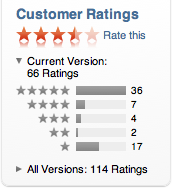Have you seen this rating pattern when you’re looking for a product on some on-line store. I’m finding it more and more common, and I’ve been calling it the ‘hook-em’ pattern. After all, I do live in the Austin, Texas area and the well known finger pattern is universal around here. (Except for the Aggies.)
The rating split is usually because some subset of the raters are upset about something, usually having nothing to do with the quality of the product itself. People can give feedback in two ways on most systems, an actual text review, and a quick numerical score, so it’s pretty easy to find what the hot-button is that’s causing the trouble, and the artificially low scores. I suppose it could work the other way too, with a poor product with some people giving it high marks for good intentions or something, but I expect that’s rare.
In practical terms, I tend to just ignore the one-star scores because they generally have nothing to do with what I’m interested in — a feel for the quality of the product. What is dangerous are those systems that don’t give you this kind of bar-chart look at the distribution of scores. In that case, the single number score can get seriously distorted, and mislead the shopper.
So cheers for the stores that give you more data.


A lot of people are posting one-star ratings on Amazon for new-release books that are being "windowed" and hence aren't available for the Kindle.
Yep. The illustrated rating in the text was people protesting an app that came out first for the iPad when they wanted it on the iPhone first. Different people causing trouble for their own reasons.
Good points. I tend to throw out both the highs and lows, seeking reviews somewhere in the middle for honest, thoughtful opinions. The one-star and five-star ratings tend to be simply thumbs-down/thumbs-up reactions. If there are enough reviews on Amazon to generate them, I'll go first for the critical review rated most helpful, then the most helpful positive review.
It's all so relative. Ideally (with novels, say) I want to know how a person rated something I've already read. Did they give five stars to something I detested, two stars to a book I adored? That's actually useful — I'll go looking for their two-star reviews for potentially enjoyable reads.
It's all so subjective. For example, I've purchased every novel you've published (that I know about) in ebook format, with just three or four still in my to-be-read queue. I recently went through my entire Calibre library and rated everything I've read. Yours get three, sometimes four stars. Sounds bad? How about when I say that I've adored Heinlein juveniles since childhood and they, too, get three or four stars?
The very few novels I rate five stars tend to be iconic, best-in-genre titles and/or a bump for "classic" status. e.g. Starship Troopers, which for me is a actually a four-star novel but, well, it's Starship Troopers. A four-star is exceptional (for the genre), gotta re-read it. Three-stars for solid, good reads that I'd enjoy reading again if the mood struck me. (Two stars for those that were okay to read once; one star to warn against getting something else from that author.)
Subjective. Useful only for me.
This serves as my rambling, roundabout way to tell you that I really like your novels. You're in the "buy without question" category and few authors gain that status with me. Of those I've completed, I liked Golden Girl the most (four stars!). Surprising depth and emotion for something with a summary and cover that suggested silliness. FWIW.
Thank you. Please write more.
— Ted
Thanks for the kind words, Ted. I'm still writing.
I have used the technique of looking for poorly rated movies listed in one of the local papers, once I realized that their reviewer had horrible taste, in my opinion. It is all subjective.